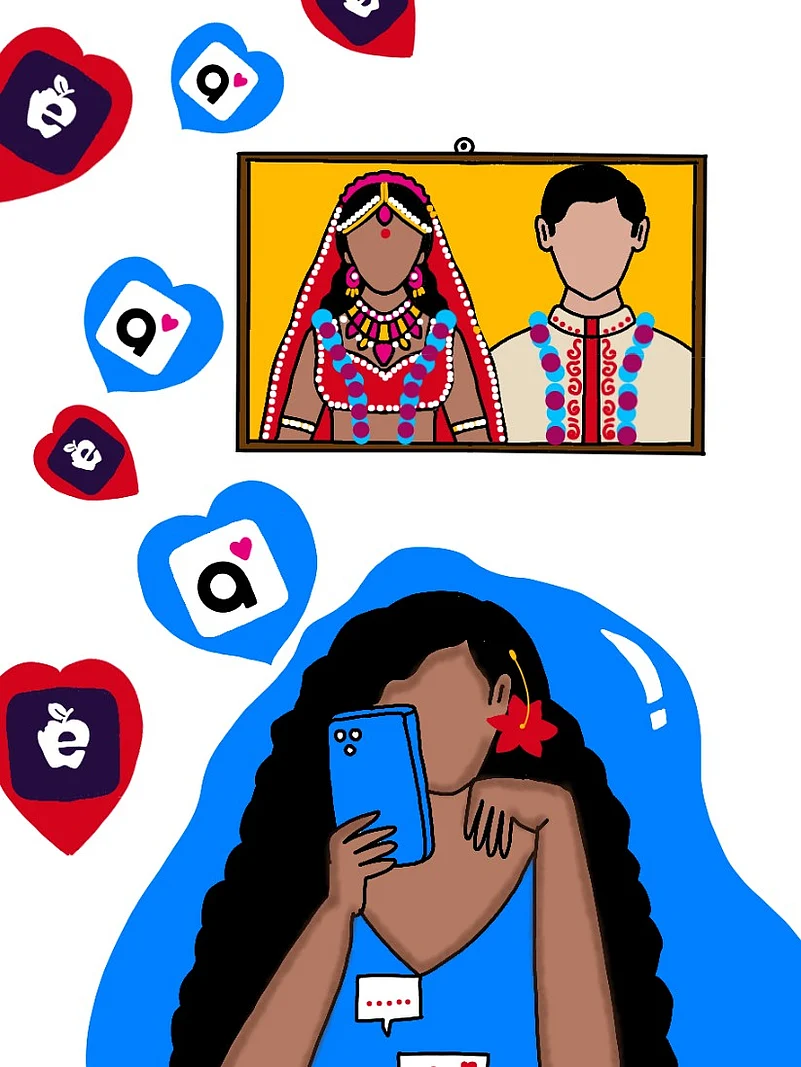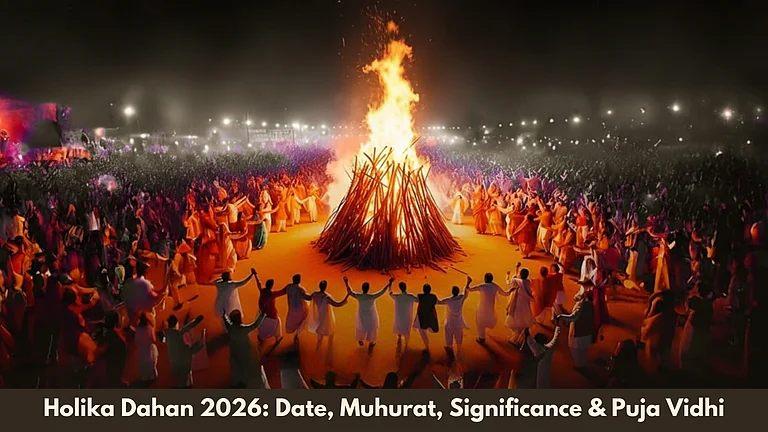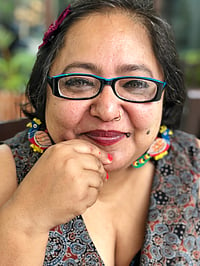
India is seeing a huge rise in the use of discreet dating apps like Ashley Madison and Gleeden in the last five years.
This increase of Indian users reflects how slowly and often consensually; the country's conventional ideas of monogamy are evolving.
There is a shift in how urban and semi-urban populations perceive loyalty in relationships
It begins with a swipe. Sometimes it’s boredom. Often, it's loneliness. But it is mostly about wanting to feel seen, heard, and desired again. For many married Indians, that single gesture has opened doors to conversations they never had within their own homes.
Discreet dating apps like Gleeden and Ashley Madison have become unlikely confessional spaces for those seeking recognition more than romance. Sometimes it’s about validation. In a country where marriage is still sacred, these digital backdoors into intimacy reveal a deeper truth — that the ache for connection often outlives the vows that promise it. As more people take a “wait and see” approach in marriage, these “discreet non-traditional dating options” – technically a euphemism for extra-marital relationships – act as fillers.
Dheeraj*, a 41-year-old male living in Delhi, has been a user for the past five years. Married for 13 years with three children, he experiences a lack of emotional intimacy with his wife. This, coupled with incompatibility, several skirmishes, and a lack of connectedness in their together-but-separate lives, drove him to Gleeden, where he met women in a similar phase—married for several years, but needing to be loved, seen, and having a vacuum in their lives filled. “I spent some time on Bumble prior to that, where I met mostly young women who wanted to be wined and dined; that was not for me,” he says.
Gleeden was established in France in 2009, and since its arrival in India in 2017, it has had a tremendous surge in user base—from 8 lakh users pre-pandemic to over 35 lakhs in 2025. It was created with married people in mind (allegedly for women by women), so the increase of Indian users reflects how slowly and often consensually, the country's conventional ideas of monogamy are evolving.
“We are moving toward conscious monogamy where fidelity is a choice, not a requirement. People are starting to redefine what commitment means to them, moving away from rigid social paradigms, and using mutual respect and emotional truth as the foundation instead. It appears to be the case more and more that couples are also open to non-traditional relationship modalities, as in the case of "open relationships," where there is more emphasis on being open, honest, and a good communicator than on exclusivity,” says Sybil Shidell, Country Manager for Gleeden India.
Paul Keable, Chief Strategy Officer, Ashley Madison, also agrees.
“India made it into the top five countries globally for signups to Ashley Madison this year. According to a recent research, 53 per cent of surveyed adults in India admitted to having had an affair, the joint highest among other countries surveyed globally. The findings shed light on India’s evolving approach to relationships, non-monogamy, and personal fulfilment,” he says.
Although Tier 1 cities are targeted as the “usual suspects” as an ecosystem for infidelity, dating apps and digital temptation, statistics reveal that the percentage of infidelity is higher in small towns. Mumbai, for instance, ranked low in the infidelity index, and Kanchipuram in Tamil Nadu ranked the highest. This is probably because urban couples often seek counselling or explore alternative relationship models like open marriages. Unhappy individuals in Tier 1 cities also have more agency, participate in social movements, and experience less dependency, which allows them to exit rather than stick around.
Thirty-year-old Rajni* lives in Patna and had an arranged marriage at the age of 25 to a naval officer who was at sea six to eight months of the year, leaving very little time to build physical intimacy. “When he returns, there are so many social engagements that I am not a priority at all,” she says.
When she brought this up, they started having arguments, and their relationship soon deteriorated. Initially, there was pressure to have a child, and she was subjected to several tests, constantly blamed and taunted, although the reports revealed that there was nothing wrong with her. Divorce is not an option for her because the pressure from her small-town family is high. She decided to try out the Gleeden app and met a few men with whom she could speak her mind. “It’s so nice when someone can really gauge your mood based on your message. This never happened in my marriage,” she said.
More than compatibility, intimacy has become a huge issue in marriages, with gender roles and social expectations often coming in the way of talking about desire, for instance. This is the gap that these apps are trying to fill.
“While people's lives are connected more than ever in today's hyper-connected world by means of technology, they are distanced emotionally. Long hours at work, the stress of urban existence, and the clash between digital and physical modes of communication have diluted true intimacy. People learn to speak more freely behind screens than in person, and many couples have difficulty maintaining emotional and physical intimacy as years go by," says Keable.
It is true that while tradition has an adhesive impact up to a point, technology is always lurking in the corner and is tempting for the most part. Perhaps it is also time to redefine marriage as less of a social contract and more about creating an emotional partnership, building a connection that leaves infidelity no space to grow. Marriage and monogamy seem to be the goal for most conventional relationships and are generally the assumed norm, but ideas of fidelity are still nuanced, thereby leaving a window open.
Have these apps created a new kind of agency — where people feel empowered to seek what they want outside marriage?
“The idea of ‘forbidden fruit’ has always carried an erotic charge in relationships. Not only does it represent what is hidden, but it also holds a hint of freedom and the fantasy of autonomy.
Dating apps give people, especially women, permission to explore what’s missing in their lives, including passion, validation, and agency. In many ways, these platforms reflect a cultural shift. Both men and women are questioning traditional monogamy and redefining honesty, intimacy, and fidelity on their own terms,” says Dr Tammy Nelson, relationship therapist and consultant for Ashley Madison
The increase in signups on discreet dating apps does reveal that many people experience emotional or physical detachment within marriage. But it is still a chicken-and-egg situation. Are there apps because the institution of marriage is failing, or is the institution failing because of the distractions? Is the loneliness a result of unfulfilled expectations or a lack of communication? Have the barriers to infidelity then shrunk by providing a way to these discreet and anonymous connections? Has the ease of 'giving it a try' made it easier for individuals to cross boundaries that they normally wouldn’t have?
In India, where marriage is still seen as sacred, the presence of married men and women on dating apps can feel like a cultural contradiction. Is it just another sign of changing times that apps have evolved from spaces designed for finding “the one” to platforms for exploring everything from flirtation to polyamory—and both married men and women have slipped into this narrative with ease?
Maybe for many people, marriage is a starting point for new forms of self-discovery—for better or worse. Yes, there is a shift in how urban and semi-urban populations perceive loyalty in relationships; tradition and tech are tugging at the very fabric of modern love, but in the end, monogamy's fate will be determined by every couple’s unique negotiation around modernity and tradition. Perhaps, in the future, we will see more holistic approaches to love that are transparent, allowing both individuals and couples to frame the meaning of loyalty, intimacy, and companionship in their own terms rather than in terms of the expediency of a one-size-fits-all.
Fidelity then, is a negotiation conducted in the glow of a smartphone screen and no longer a social rulebook written in stone. The sharp rise in “discreet” dating apps across India does not signal moral decline as much as it marks a broader cultural shift—a transition from silent obligation to open self-expression, from prescribed ideals to individual choice.
As married Indians navigate unmet needs and evolving definitions of love, monogamy in India is being actively re-examined and redefined; it is no longer assumed but consciously chosen.
*Names have been changed upon request.
Lalita Iyer is an Associate Editor at Outlook and the author of Aging (Un)Gracefully, The Whole Shebang, Raising Mamma and other books.































